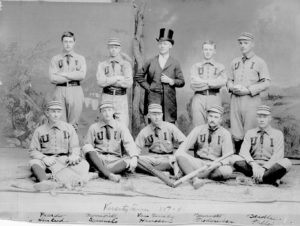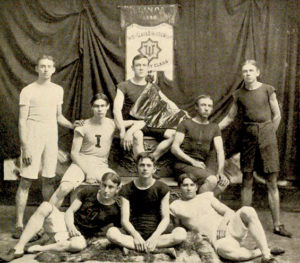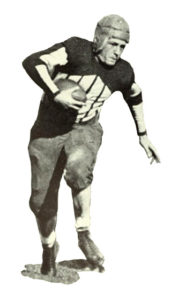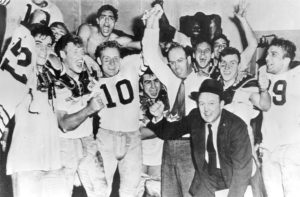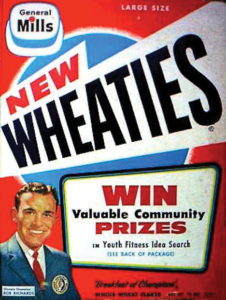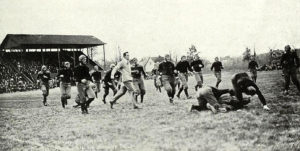Sporting times: Early years of Illinois sports
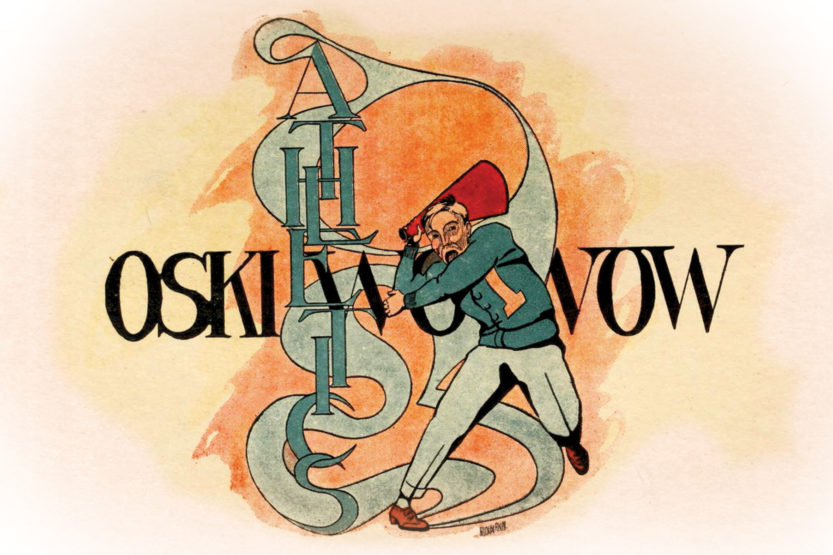
A vast athletic complex spreads across the University of Illinois campus. And it continues to grow. What would Illini Athletics Director George Huff think of the newly renovated State Farm Center? How would football Head Coach Bob Zuppke feel if he heard about Memorial Stadium’s $132 million upgrade? It was built for less than $2 million back in 1923.
Athletics have been a part of campus and community life since 1879. That’s 138 years’ worth of history.
In October 2016, Illinois Athletics Director Josh Whitman announced plans for an Athletic Hall of Fame. Almost 1,000 names were on the original list of potential honorees. The initial class of 28 inductees will include such Illini greats as linebacker Dick Butkus, basketball player Dee Brown and volleyball player Mary Eggers Tendler.
The history of Illinois sports features great athletes, championship teams and legendary coaches. Here is a look, era by era, at the best of the best. We’ve also included key moments in each program’s history.
Early Years: program highlights
Baseball: First game, Oct. 2, 1879. The Illinois baseball team beat Illinois College 12-5. That squad played only one game. Multiple-game seasons began in 1883, when the team played three games.
Football: First game, Oct. 2, 1890. A Scott Williams-coached Illinois lost 16-0 at Illinois Wesleyan. On Nov. 27, Illinois defeated Illinois Wesleyan 12-6 for the first football win in school history.
The Big Ten: On Jan. 11, 1895, leaders from Illinois, Michigan, Minnesota, Northwestern, Purdue, Wisconsin and the University of Chicago met at the Palmer House in Chicago to organize what would become one of the most powerful conferences in collegiate athletics. Four years later, Indiana and Iowa joined.
Men’s Track and Field: First season, 1901. The squad finished fifth in its first Big Ten meet. To date, the program has won five NCAA outdoor titles, the most recent in 1947.
Men’s Tennis: First season, 1890. The 2003 team, coached by Craig Tiley (1994-2005), won the school’s only NCAA title.
Men’s Basketball: First season, 1906. The team, coached by Elwood Brown (1905-06), finished 6-8. Its first game (Jan. 12, 1906) resulted in a win against Champaign High School.
Men’s Gymnastics: First season, 1905. To date, the program has won a Big Ten-record 10 NCAA titles, the most recent in 2012.
Men’s Swimming: First season, 1905. The program was discontinued in 1993.
Men’s Golf: First season, 1908; first Big Ten tournament, 1920. The program has become a national powerhouse under current Head Coach (and former Illini golfer) Mike Small (2000-present).
Wrestling: First season, 1910. To date, the program has garnered 24 NCAA individual titles, including two by current team member Isaiah Martinez. He is in line to become the program’s first four-time champion.
Notable Coaches and Athletics Directors
Coach (1892-93) and Athletics Director (1892-94)Edward K. Hall. Hall coached baseball and football, and as director, helped establish the foundation for Illinois Athletics. A successful businessman, Hall later gained fame for his work with the NCAA.
Coach (1895-1919) and Athletics Director (1901-36) George Huff. Considered the father of Illinois athletics, Huff was a so-so football coach (just above .500), but a wizard at coaching baseball, winning more than 300 games and 11 Big Ten titles. He briefly managed a professional baseball team, the Boston Americans, in 1907.
Football Coach Robert Zuppke (1913-41). The winningest football coach in school history, the Hall of Famer recruited Red Grange and won four national titles (1914, 1919, 1923, 1927) and seven Big Ten championships (1914-15, 1918-19, 1923, 1927-28). A football genius, he is credited with introducing a wide range of innovations, including the huddle, screen pass and flea flicker.
Outstanding Athletes
Baseball and Basketball: Lou Boudreau (1936-42). As a player/manager, Boudreau helped the Cleveland Indians win the 1948 World Series. At Illinois, he is one of only three athletes in school history to have his number retired, joining Red Grange and Dick Butkus.
Football: Red Grange (1923-25). Illinois sports started with the “Galloping Ghost.” When the Big Ten Network ran its list of Big Ten icons, Grange was No. 1 and rightfully so. In the Memorial Stadium dedication game against Michigan in 1924, Grange scored four touchdowns before the Wolverines knew what hit them. He then ran for a fifth and threw for a sixth in a 39-14 victory. Grange, a member of both the College and Pro Football Halls of Fame, helped legitimize the fledging NFL by playing for the Chicago Bears (1925, 1929-34).
Football and Basketball: Chuck Carney (1918-21). Carney earned All-American honors in both football and basketball and was inducted into the College Football Hall of Fame in 1966. He was an underappreciated superstar.
Football and Baseball: George Halas (1914-18). Long before he played for, coached and ran the Chicago Bears, Halas was a standout on the field at Illinois. He also played outfield for the New York Yankees in 1919.
Men’s Track and Field: Harold Osborn (1919-22). As an Olympic gold medalist at the 1924 Paris games, Osborn set records in both the high jump and decathlon.
Wrestling: Allie Morrison (1927-29). The 1928 Big Ten champion, Morrison won a gold medal in the freestyle featherweight category that same year at the Olympic Games in Amsterdam. He is a member of the Wrestling Hall of Fame.
Appearing in a Jan. 29, 1911, account of a basketball game against Purdue, the earliest use of “fighting Illini” applied “fighting” more as a simple adjective describing the team’s efforts (albeit unsuccessful ones) just before the end of the first half. However, by March 3, 1911, the team appeared have earned “fighting Illini” as a formal appellation as evidenced in the newspaper report: “Only a small crowd turned out to see our fighting Illini chase the Gophers back to their holes.” Well before the April 1917 U.S. entry into World War I, The Daily Illini included several further references to athletic teams as “fighting Illini.” Once University of Illinois students and alumni began participating in WWI, the use of “fighting Illini” became mixed, sometimes referring to the soldiers at war and sometimes referring to the University’s athletic teams, and this overlapping usage prevailed for the balance of the War. —Chris Prom, photo courtesy of UI Archives/Illio 1911
War Years and Beyond: Program Highlights
Men’s Fencing: The program won NCAA titles in 1956 and 1958; it was shuttered in 1993.
Notable Coaches and Athletics Directors
Men’s Basketball Coach (1936-47) and Athletics Director (1942-59) Doug Mills. The former Illinois basketball player (1927-30) returned to his Alma Mater to direct athletics and coach the basketball program. As coach, Mills won 151 games and three Big Ten titles, which included leading the “Whiz Kids” in the 1940s.
Head Coach Ray Eliot led the 1951 Illini football team to the Big Ten title and the program’s fifth national title. Courtesy of UI Archives
Football Coach Ray Eliot (1942-59). Eliot led the 1951 team to the Big Ten title and the program’s fifth national championship. Contributing to the team’s success was future College Football Hall of Fame inductee Al Brosky (1950-52) and All-American John Karras (1949-52), who helped crush Stanford 40-7 in the Rose Bowl.
Men’s Basketball Coach Harry Combes (1947-67). The Monticello, Ill., native and former Illinois basketball player led his Alma Mater to three Final Four appearances. He won more than 300 games at Illinois.
Outstanding Athletes
Basketball: Andy Phillip (1941-43, 1946-47). The Granite City, Ill., native was a star for the 1940s “Whiz Kids” team. He was just getting started, too. Phillip earned five All-Star nods during an 11-year NBA career.
Basketball: Johnny “Red” Kerr (1949-52). Kerr helped the 1952 Illini win the Big Ten and reach the Final Four. After Illinois, he enjoyed a long career as an NBA player, coach and broadcaster.
Basketball and Baseball: Jerry Colangelo (1960-62). The Chicago Heights native originally signed with Kansas before returning to his home state. An All-Big Ten player at Illinois, Colangelo made an even bigger mark as a pro sports owner/general manager in both basketball and baseball. Later in life, he led the resurgence of USA Basketball.
Football, Basketball and Track: Thomas Dwight “Dike” Eddleman (1945-49). Eddleman is considered Illinois’ all-time greatest athlete. In fact, the award for the school’s top athlete is named in his honor. An Olympic medalist in the high jump, Eddleman, who also played in the NBA, holds the Illinois record for longest punt (88 yards) and punt return (92 yards).
Football: J.C. Caroline (1953-54). An All-American running back who played on the 1953 Big Ten Championship team, Caroline led the nation in rushing and should have won the Heisman Trophy. He played defensive back for the Chicago Bears from 1956-65.
Football: Dick Butkus (1962-64). The greatest linebacker in the history of the game finished third in the Heisman Trophy voting. Butkus led Illinois to the 1963 Big Ten title and Rose Bowl win. An early pick in the NFL draft, he was a star with the Chicago Bears. Butkus is a member of both the College and Pro Football Halls of Fame.
Track: Bob Richards (1947-49). The “Vaulting Vicar” won pole-vault gold medals at the 1948 and 1952 Olympics. Richards also was the first athlete to be featured on the front of a box of Wheaties breakfast cereal.
Modern Era: Program Highlights
Women’s Basketball: First season, 1974. Coached by Steven Douglas (1974-76), the team lost its opener 72-16 to Indiana on Dec. 6. On Jan. 23, 1975, it beat Eastern Illinois 57-51 in overtime. Why is that game significant? It was the first time the women’s team played at Assembly Hall (now the State Farm Center).
Volleyball: First season, 1974. Coached by Kathleen Haywood (1974-75), the team went 19-9 during its first season. Home matches were held at Kenney Gym. After one year, Haywood was replaced by Terry Hite.
Women’s Swimming and Diving: First season, 1974. The first meet was the three-team Illinois Invite on Dec. 7, which the Illini won.
Women’s Tennis: First season, 1974. Its first match was a win against Purdue. Peggy Pruitt, the first head coach, led the team to a 6-0 season.
Women’s Golf: First season, 1974. The team was first coached by Betsy Kimpel (1974-78). She was succeeded by Paula Smith (1978-2006), who ran the program for almost 30 years.
Women’s Gymnastics: First season, 1975. Coached by Allison Milburn (1975-77), the team went 6-2. Women’s gymnastics wasn’t recognized by the Big Ten until 1982.
Women’s Track and Field: First season, 1974. One of the most successful programs on campus, it has produced a string of Olympians and national champions.
Women’s Soccer: First season, 1997. Led by Head Coach Jillian Ellis (1997-98), the team won its first match 4-0, on Sept. 5 against Loyola-Chicago. Ellis would later become head coach of the U.S. women’s national soccer team.
Softball: First season, 2000. First game was a 3-2 loss to Coastal Carolina on March 11. Inaugural Head Coach Terri Sullivan (2000-16) served until Tyra Perry took over in 2016.
Notable Coaches and Athletics Directors
Athletics Director Cecil Coleman (1972-79). Coleman is best known for hiring the school’s winningest basketball coach, Lou Henson (1975-96). It was a surprise choice, with speculation that the hire would be Don DeVoe (who served as head coach of Tennessee, Virginia Tech and Wyoming, among other teams).
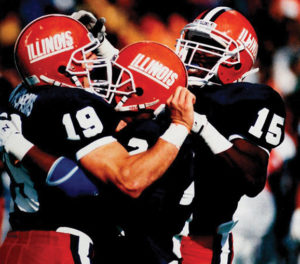
Illini football players celebrate after a defensive play during the 1992 John Hancock Bowl. Since its inception, the Illinois football program has appeared in 18 bowl games. Courtesy of UI Archives/Illio 1992
Athletics Director Neale Stoner (1980-88). Hired away from Cal State-Fullerton, Stoner led Illinois Athletics for most of the 1980s. He recruited Head Coach Mike White (1980-87), who led the football team to a perfect 9-0 Big Ten season in 1983. Stoner also hired White’s replacement, John Mackovic.
Football Coach and Athletics Director John Mackovic (1988-91). Arguably the most effective football coach in school history, he led the team to four consecutive bowl bids. When Texas called, he made the move. Had he stayed, Mackovic might have piled up hundreds of wins. He took on the added role of Athletics Director after Stoner’s departure.
Athletics Director Ron Guenther (1992-2011). Former Illini MVP, Guenther played offensive guard on the Illinois football team during the 1960s. Only Huff and Mills had longer tenures in charge of Illinois sports. Guenther made smart coaching hires in several sports, but was at his best in basketball, selecting Lon Kruger (1996-2000), Bill Self (2000-03) and Bruce Weber (2003-12) to lead the program. All three won at a high level.
Athletics Director Josh Whitman (2016-present). A top tight end for Head Coach Ron Turner during the late 1990s, Whitman went on to earn his law degree before returning to Illinois and working under Guenther. After stints as athletics director at two Division III schools, he replaced outgoing Athletics Director Mike Thomas (2011-15) in 2016. Early into his tenure, Whitman hired former Chicago Bears Head Coach Lovie Smith, a move that brought positive national publicity to the Illini football program.
Athletics Administrator and Head Coach Karol Kahrs (1996-2000). In 1974, Kahrs helped establish Illinois’ women’s athletics programs. She served as head coach of women’s basketball, softball and volleyball. Kahrs was inducted into the National Association of Collegiate Directors of Athletics and was the first chairman of the Big Ten Women’s Athletic Administrators.
Men’s Basketball Coach Lou Henson (1975-96). Henson is the winningest coach in Illini basketball history. The court at State Farm Center is named in his honor. Beloved at Illinois, he led the 1989 Flyin’ Illini to the Final Four. Henson was inducted into the College Basketball Hall of Fame in 2015, an honor long overdue.
Men’s Basketball Coach Lon Kruger (1996-2000). Kruger led the team to three NCAA tournament berths in four seasons before leaving for the NBA. He coached five programs to NCAA tournaments.
Men’s Basketball Coach Bill Self (2000-03). In his three years, Self led the Illini to three NCAA appearances, which included a spot in the Elite Eight. He recruited the players that helped the team reach the 2005 NCAA title game. Self continued his success at Kansas, winning an NCAA title with the Jayhawks.
Men’s Basketball Coach Bruce Weber (2003-12). Weber had the difficult task of following Self at Illinois, but he made it work. In nine seasons, he led Illinois to six NCAA tournament appearances. Weber continued his career at Kansas State.
Men’s Golf Player and Coach Mike Small (2000-present). A standout golfer at Illinois with Steve Stricker (1988-90), Small returned to the golf program as coach and has built Illinois into a national powerhouse. He continues to send golfers into the pro ranks, including rising star Thomas Pieters, a member of the European Ryder Cup team.
Men’s Tennis Coach Craig Tiley (1994-2005). Under Tiley’s leadership, Illinois won the NCAA national title in 2003 with a 32-0 record and won the ITA National Indoor Championships in 2003 and 2004. He was an eight-time Big Ten Coach of the Year and received Wilson/ITA Division I National Coach of the Year honors in 2003 and 2004.
Volleyball Coach Mike Hebert (1983-95). Hebert took what had been a struggling program and built it into a Big Ten force. Hebert-led teams won 72 percent of their matches in 13 years and reached two Final Fours.
Women’s Basketball Coach Theresa Grentz (1995-2007). A former Rutgers and U.S. Olympic coach, Grentz helped rebuild the Illini women’s program, putting the team in the NCAA tournament and winning the Big Ten title.
Women’s Golf Player and Coach Renee Heiken Slone (2006-present). A three-time All-American, Slone was named the 1993 National College Player of the Year by the National Golf Coaches Association and Golf Magazine. She was a tournament medalist eight times and won the Big Ten Player of the Year Award twice. Currently, Slone is head coach of the women’s golf team.
Wrestling Coach Mark Johnson (1992-2009). The Rock Island, Ill., native is a two-time Big Ten Coach of the Year and the winningest coach in program history. Johnson took over a team that was near the bottom of the Big Ten and produced multiple conference and NCAA individual champions.
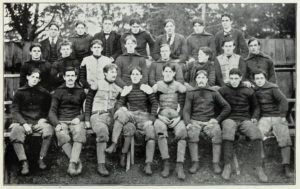
Led by Head Coach George Huff, the 1898 Illini football team finished 4-5. Courtesy of UI Archives/Illio 1898
Outstanding Athletes
Baseball: Darrin Fletcher (1985-87). The Oakwood, Ill., native is one of the top players in program history. He went on to enjoy a long career as an MLB catcher, becoming an All-Star in 1994.
Baseball: Scott Spiezio (1991-93). A two-time All-Big Ten performer, Spiezio had a solid MLB career, earning two World Series rings. His clutch three-run homer in the 2002 World Series helped the Los Angeles Angels rally for a victory that forced a Game 7. He won the second title with the St. Louis Cardinals.
Football: The school’s career receiving leader, David Williams (1983-85), is the most recent Illini inducted into the College Football Hall of Fame. He became the first collegiate athlete to have 100 catches in a season.
Football: Jeff George (1987-89). George started his collegiate career at Purdue, but transferred to Illinois to play for Head Coach Mike White. In two seasons with Head Coach John Mackovic, George helped lead the team to consecutive bowl appearances. The Indianapolis Colts drafted him No. 1
in the 1990 NFL draft.
Football: Dana Howard (1991-94). A linebacker from East St. Louis, Ill., Howard won the school’s first individual football award, the Butkus Award, in 1994. Howard left Illinois as the Big Ten’s career leader in tackles.
Football: Kevin Hardy (1992-95). One year after Howard earned the Butkus Award, Hardy followed suit. The No. 2 overall pick by the Jacksonville Jaguars in the 1996 NFL draft, he enjoyed a successful nine-year career.
Football: Simeon Rice (1992-95). A Chicago Mount Carmel graduate, Rice was the No. 3 pick in the 1996 NFL draft. He had 122 sacks during his 12-year professional career and won a Super Bowl with Tampa Bay.
Men’s Golf: Steve Stricker (1988-90). A Big Ten champion at Illinois, Stricker has won 12 PGA tournaments during his career. He has played on multiple U.S. teams in international competitions.
Men’s Basketball: Eddie Johnson (1978-83). Johnson left Illinois as its scoring leader. He also hit the winning shot to beat Magic Johnson and Michigan State during its championship season. A second-round pick by the Kansas City Kings, Johnson spent 17 years in the NBA.
Men’s Basketball: Nick Anderson (1987-89). Anderson was a star player with the Flyin’ Illini, which reached the Final Four in 1989.
Men’s Basketball: Kendall Gill (1986-90). While not as heavily recruited as some of his teammates, Gill was the linchpin of the 1989 team. During his senior year, he led the team in scoring and earned All-American honors. Gill was the No. 5 overall pick in the 1990 NBA draft and played for six teams during his long career.
Men’s Basketball: Kenny Battle (1987-89). Considered the heart and soul of the 1989 team, Battle was famous for both his athleticism and his hustle. He played four years in the NBA.
Men’s Basketball: Brian Cook (1999-03). As a senior, Cook earned the Big Ten MVP award in 2003. A first-round draft pick by the Lakers, he played for five NBA teams.
Men’s Basketball: Deron Williams (2002-05). No Illinois player has ever been picked earlier in the NBA draft than Williams. (The Jazz selected him third in the first round in 2005.) A multi-year NBA All-Star, he also played on the 2008 and 2012 Olympic basketball teams. Williams now plays for the Cleveland Cavaliers.
Men’s Basketball: Dee Brown (2002-06). A popular guard for the 2005 team and an NCAA runner-up, Brown was among the all-time leaders in points, assists, steals and three-pointers for Illinois.
Men’s Track: Craig Virgi (1973-76). An NCAA cross-country champion, Virgi won multiple Big Ten track titles and was a three-time Olympian.
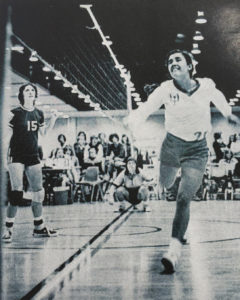
Women’s volleyball debuted in 1974. During the 1976 campaign (shown), the team finished 25-14. Courtesy of UI Archives/Illio 1976
Volleyball: Mary Eggers Tendler (1985-88). A three-time All-American and a four-time First Team All-Big Ten selection, Eggers was named the 1988 Honda Broderick Award winner as the nation’s top player.
Women’s Basketball: Ashley Berggren (1996-98). Second on the Illinois career scoring chart, Berggren helped lead the program’s resurgence in the 1990s.
Women’s Basketball: Jenna Smith (2006-10). The most statistically dominant player in the program’s history, Smith holds the records for all-time scoring and rebounding and is second in blocked shots.
Women’s Gymnastics: Nancy Thies Marshall (1976-77). Marshall was a two-time Big Ten Gymnast of the Year and a four-year member of the U.S. National Team. She competed in the 1972 Olympics and was inducted into the World Acrobatic Society Hall of Fame in 2010.
Women’s Track and Field: Tonja Buford-Bailey (1990-93). As a hurdler at Illinois, Buford-Bailey won 25 individual Big Ten titles, had 10 All-American performances and was a four-time Big Ten Athlete of the Year. She also competed in the 1992, 1996 and 2000 Olympics.
Women’s Track and Field: Perdita Felicien (2000-03). Felicien set Illinois, Big Ten and NCAA records in the 60-meter and 100-meter hurdles. She was named a 2001 and 2003 NCAA Track Athlete and competed in the 2000 and 2004 Olympics. n
Additional reporting provided by the UI Department of Intercollegiate Athletics.
Bob Asmussen is a sports writer with the Champaign News-Gazette and author of University of Illinois Football Vault and other sports books.

